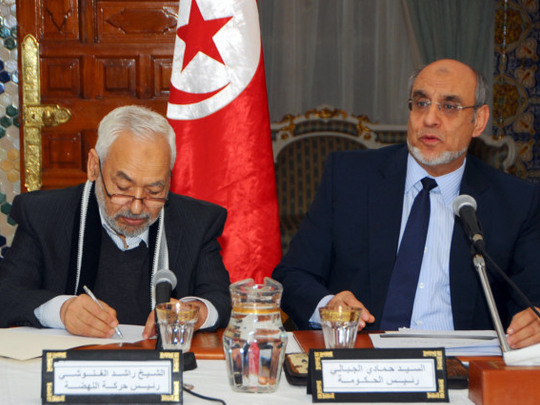
Tunisian Prime Minister Hamadi Jebali said on Tuesday that he has submitted his resignation to President Munsif Marzouki, a day after his efforts to form a government of technocrats failed.
"I promised and assured that, in the event that my initiative failed, I would resign as head of the government, and that is what I have done," Jebali said in remarks broadcast on television after meeting Marzouki.
Jebali, who had warned of chaos if his plan fell through, made a last ditch effort to push for “another solution” and was due to meet Marzouqi late afternoon.
Jebali met with the cabinet in the morning to say goodbye and to ask them to “continue to expedite current matters,” one government member said.
The premier was left out on a limb on Monday after Al Nahda rejected his proposals for a non-partisan government, exacerbating Tunisia’s biggest political crisis since the uprising two years ago.
“I will go [Tuesday] to the president to discuss the next stages, but I noted progress during the political discussions in terms of seeking a consensus around another solution,” Jebali said Monday.
The new formula should emerge “in the coming days,” he added after meeting political leaders.
Jebali first floated his initiative in the wake of public outrage over the killing in broad daylight of outspoken government critic Shukri Belaid by a lone gunman outside his Tunis home on February 6.
The murder enflamed simmering tensions between liberals and Islamists in the once proudly secular Muslim nation, with Belaid’s family accusing Al Nahda of his assassination, a charge the Islamists strongly deny.
For months, the ruling coalition has failed to overhaul the government, laying bare divisions within Al Nahda.
Jebali admitted defeat in his plan, which he had hoped would be able to overcome the political divisions that have been blamed for igniting Salafist-led violence across the country in recent months.
But he said “another form of government” was still a possibility.
And he insisted that, despite its failure, his initiative had at least succeeded in “getting everyone around a table” and in preventing Tunisia “from falling into the unknown.”
His plans had been bitterly opposed by Ennahda hardliners, represented by the veteran party leader Rashed Gannouchi, who are refusing to give up key portfolios and insist on Al Nahda’s electoral legitimacy.
The Islamists control the interior, foreign and justice ministries and dominate the national assembly.
Gannouchi said the representatives of some 15 parties had agreed on Monday on the need for a government with “political competences” and tasked with holding elections as soon as possible.
“We in Al Nahda want to ensure that Jebali continues to chair [the cabinet], and so do all those who took part in this meeting,” he told AFP.
Aziz Kirshen, representing Al Marzouqi’s Congress for the Republic (CPR), said an agreement had been reached for “the formation of a mixed government” of politicians and technocrats, but without giving details.
The political deadlock has left the country paralysed.
“Everything has stopped. The problem is that nobody thinks about the general interest but only of their special interests,” a government official told AFP.
As well as the row over the new government, there is deadlock over the drafting of a constitution, with parliament divided over the nature of Tunisia’s future political system 15 months after it was elected.
Since the revolution that toppled dictator Zine Al Abidine Bin Ali, Tunisia has also been rocked by violence blamed on radical Salafists, and ongoing social unrest over the government’s failure to improve poor living conditions.












